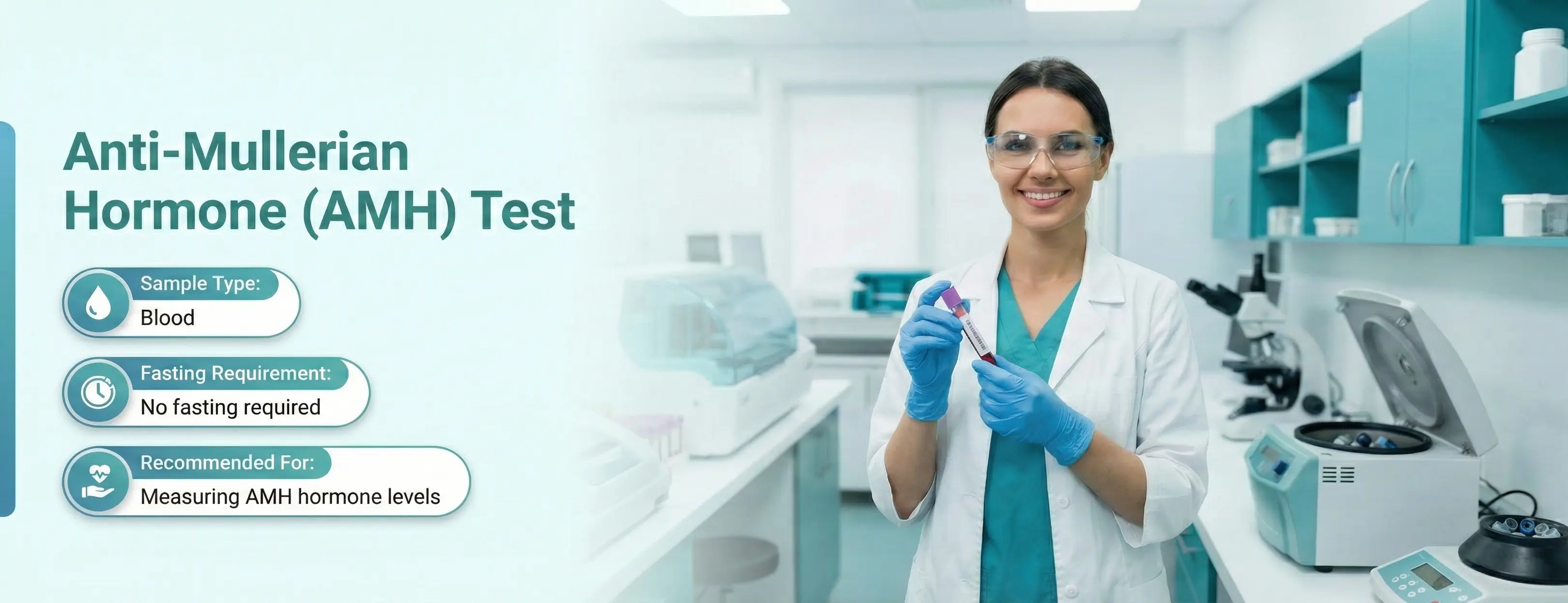704+ orders placed in your location
100% NABL & ISO Certified Lab • 100% Accurate Reports
Anti-Mullerian Hormone (AMH) Test
AMH hormone test, Müllerian-inhibiting hormone, Müllerian inhibiting factor
- SummaryThe Anti-Mullerian Hormone (AMH) Test measures the anti-müllerian hormone level in the blood. AMH is responsible for the development of sexual organs and the growth of eggs. This test is done by taking a blood sample from a vein in your arm, and fasting is not required for this test. Read more
- Reports Within15 HrsView Sample Report100% NABL & ISO Certified Labs
- SampleBlood
- AgeAll Age Group
- GenderFemales
- FastingNot Required
PharmEasy Promises
Know More About The Test
A quick info on AMH test
Overview
The AMH test evaluates the level of anti-müllerian hormone in the blood sample. AMH is a hormone produced by the gonads. In males, testicles and females, ovaries produce AMH.
The role of AMH, as well as its amount, varies by gender and age. This test detects the presence of AMH in the blood.
The role of AMH is vital in the development of the sex organs of the baby in the womb. The reproductive organs of a baby mature in the first weeks of pregnancy. The baby will be born with the genes to be either a male (XX genes) or a female (XY genes).
AMH reduces the development of female organs while enhancing the growth of male organs. In male baby (XY) genes, high levels of AMH and other male hormones are produced. In boys, the AMH range remains high till puberty and begins to decrease after that.
If there isn't enough AMH to prevent the formation of female organs, organs for both sexes are formed. Then, it is unclear to determine if a baby's genitals are male or female. It is known as Ambiguous Genitalia.
In a baby with female (XX) genes, a minute level of AMH is produced.
Female reproductive organs develop due to this AMH. In young girls, AMH levels stay low until adolescence. During adolescence, ovaries (glands that produce egg cells) begin to form AMH.
A female has roughly one million eggs (oocytes) at birth. The oocytes decline to about 500,000 during childhood. Only a minute percentage of these remaining eggs will mature into follicles. The eggs grow mature one at a time, throughout a woman's monthly menstrual cycle. During the process of egg maturation and release, AMH has a crucial role.
AMH will then gradually decrease in women after their reproductive years. It becomes undetectable after menopause.
The AMH test levels in women can detect fertility issues and the ability to conceive. The test can potentially diagnose menstruation abnormalities.
An AMH test is commonly used to determine a woman's ability to create fertile eggs for pregnancy. In the reproductive age group, ovaries produce hundreds of eggs. As a woman gets older, the egg number decreases.
A woman's blood AMH values indicate how many viable egg cells she still has. This is her ovarian reserve.
A woman with a high ovarian reserve has more chances of getting pregnant. If a woman's ovarian reserve is low, her chances of getting pregnant decrease.
The AMH test helps the doctor track the health of women who have specific types of ovarian cancer. The AMH test is used for the diagnosis of ovarian cancer.
In infants (males), the AMH test evaluates testicular functions. The test is repeated every three months in boys who are under treatment for testicular dysfunction.
In young girls, the AMH test helps to detect the cause for male traits.
In adolescent women, the AMH test assesses the number of eggs that are remaining. With the AMH test, women can understand their chances of getting pregnant and identify the onset of menopause.
Risk Assessment
PCOS, Infertility, Ovarian cancer, Early menopause
What does this test detect?
The AMH ideally measures the levels of anti müllerian hormone in the blood sample.
Indications for AMH Test
The AMH test is prescribed for the following conditions:
- To determine a woman's ability to create fertile eggs.
- To determine a woman’s ability to conceive via IVF (in-vitro fertilisation) treatment, whether she will respond well to the treatment.
- In the diagnosis and prognosis of ovarian cancer.
- To detect early menopause.
- For gender differentiation in infants in case of ambiguous genitalia.
- To check the testicular function in newborn males.
- To diagnose Polycystic Ovarian Syndrome (PCOS). Symptoms of PCOS include:
- Irregular menstrual cycles
- Early menopause
- Amenorrhea
- Acne on the face, neck and back
- Excessive hair growth on the body and the face
- Sudden weight gain
- Acanthosis nigricans or blackish-purplish discolouration of the skin due to insulin resistance
How frequently should you take this test?
The AMH test is repeated based on your symptoms and as per your doctor’s advice. It is usually repeated every 3-6 months based on the prognosis of the condition.
In the case of ovarian cancer, you may need to repeat the AMH test more frequently.
Test Preparation
What to Expect During the Test
Before the Test
Usually, there's no need to make any special preparations for the AMH test. However, if your doctor has recommended this test along with another one that requires fasting, they might advise you to avoid certain foods. Talk to your doctor before any test for the best outcomes.
During the Test
A vein in your arm will be pricked to collect a blood sample. Here's what you can anticipate during the procedure:
- The site where the needle is inserted will be cleaned with an antiseptic solution.
- A tourniquet will be applied to your arm to make finding the veins easier.
- A needle will be inserted into the vein to draw blood. You might experience a quick pinch for a few seconds.
- The blood will be collected in a vial/tube, which will be labelled with your details.
After the Test
After the blood has been drawn:
- A bandage will be applied to the area where the needle was inserted to prevent any bleeding.
- It's normal to have some bruising. Some people might feel dizzy and should rest for a few minutes.
- In case of bleeding, pain, or rashes at the site of the puncture, it's important to reach out to your healthcare provider.
Parameters
The AMH test measures the levels of the anti müllerian hormone in the body.
Ranges
The AMH normal range in females is as follows:
|
Age (in years) |
Median AMH Levels |
|---|---|
|
20-24 |
6.23 |
|
24-30 |
5.65 |
|
30-33 |
4.55 |
|
33-37 |
3.74 |
|
37-40 |
2.78 |
|
40-55 |
1.09 |
|
AMH Level |
Interpretation |
|---|---|
|
Over 4.0 ng/ml |
High (often PCOS) |
|
1.5 - 4.0 ng/ml |
Normal |
|
1.0 - 1.5 ng/ml |
Low normal |
|
0.5 - 1.0 ng/ml |
Low |
|
Less than 0.5 ng/ml |
Very low |
Your age and gender determine the normal range of the AMH results.Talk to your health care provider if the values are beyond AMH normal range.
The normal values and reference ranges of the test may vary from lab to lab. Please refer to the ranges mentioned in the report and consult a doctor to understand the interpretation of lab reports.
Test Result Interpretation
In infant (male)
Low amounts of AMH in a male child may suggest a problem with the AMH gene on chromosome 19. This chromosome controls AMH production and is associated with malfunctioning testicles. Male hormone deficiency can induce ambiguous genitalia and abnormal reproductive organs.
A low level of AMH in a male child could indicate hereditary problems. Below normal AMH range in boys is an indication of hormonal issues.
A male child with undescended testes might have AMH normal range and androgens. These AMH results suggest that testicles are present and functional at some other location. Surgery and hormone therapy can be used to treat this disease.
In women
Higher than normal AMH levels indicate polycystic ovary syndrome. And if the AMH level is low, it's an indication of low fertility. Low AMH could also be an indication of perimenopause. It is normal for young girls and women after menopause to have low levels of AMH.
AMH levels also indicate the prognosis of treatment in cases of ovarian cancer.
The AMH test results help fertility specialists in interpreting the fertility rate. It can also assist in determining when one should try to get pregnant. A high value of AMH within the normal range may indicate that the chances of becoming pregnant are better. The higher the AMH levels within the normal range, the better the chances of getting pregnant.
Price/Cost
The cost of an AMH (Anti-Mullerian Hormone) Test varies depending on the city and the lab. In general, an AMH test price ranges between INR 1275 and INR 2969. Here is a breakdown of the average cost of an AMH test in some major cities in India:
City | Min Price | Average Price | Max Price |
1275 | 2122 | 2969 | |
1275 | 2122 | 2969 | |
1275 | 2122 | 2969 | |
1275 | 2122 | 2969 | |
1275 | 2122 | 2969 | |
1275 | 2122 | 2969 | |
1275 | 2122 | 2969 | |
1275 | 2122 | 2969 | |
1275 | 2122 | 2969 | |
1275 | 2122 | 2969 |
Risks and Limitations
The AMH test is a commonly done blood test with rare risks of complications. See your doctor if you notice:
- Persistent bleeding at the site of needle insertion.
- The skin where the needle went in becomes red, swollen, or hurts.
Limitations of the test
- The accuracy of the test could be affected due to equipment or human mistakes.
- Misinterpretation of the markers leads to inaccurate reports.
Was This Test Information Helpful?
Please rate your experience
References
People Also Ask
What is a good AMH level to get pregnant?
What is the best time to do the AMH test?
Can AMH 0.2 get you pregnant?
What is a good AMH level for age 35?
Can stress lower AMH levels?
Popular Tests
Have any doubts? Ask us.
Ask us anything about the Anti-Mullerian Hormone (AMH) Test to understand it better
We provide trusted, expert-curated health content to support better awareness,prevention, and care.
Backed by experienced doctors, medical experts, and strict editorial standards.

